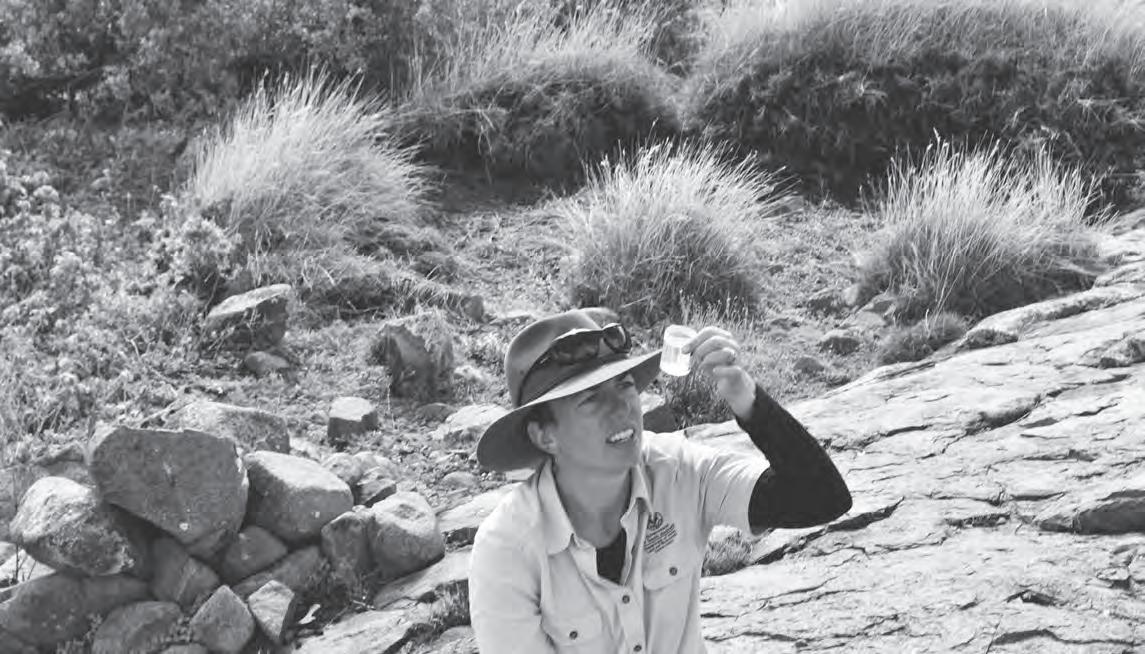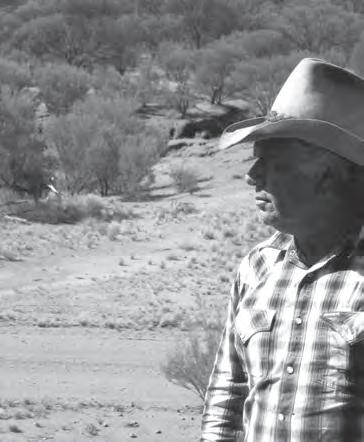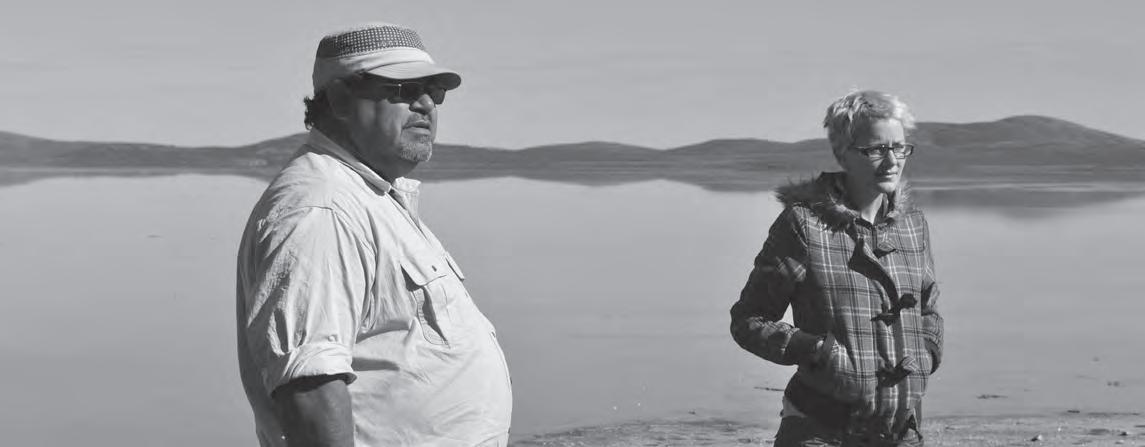
8 minute read
Inside: Protecting rock holes in the Gawler Ranges
The Gawler Ranges native title claim group will be the first native title claim group in South Australia to establish a comprehensive, spatial database system for storing and managing their cultural and ecological information.
The database came about during the development of a whole of country management plan for the Gawler Ranges native title claim group. South Australian Native Title Services continues to develop and deliver a partnership project with the South Australian Arid Lands Natural Resources Management Board. This project centres on the cultural and ecological assessment and protection of rock-holes in the Gawler Ranges. In 2010 SANTS received funding from the SAAL NRM Board to undertake the project in partnership with the Board, the Department for Water (previously the Department of Water, Land and Biodiversity Conservation), local pastoralists and most importantly the Gawler Ranges native title claim group. As with previous activities through this project, claimants returned to country through field work to visit these important places and share their knowledge with other experts and jointly assess rock-hole condition and identify management options. Under the guidance of consultant Troy Maille (Cultural Systems Solutions),
Advertisement
Above: State Government Ecologist Mel White examining a water sample during the Gawler Ranges rock-hole field work, June 2010.
the claim group has held workshops to develop a database system to meet their needs and aspirations for cultural information storage and management. The group has also worked with other stakeholders in the SAAL NRM Board and staff of the State Government (Aboriginal Heritage Branch) to ensure that their database compliments and is consistent with existing ecological and cultural databases.
This will allow for information to be transferred to and from the Gawler Ranges database and other information management systems such as those managed by the Aboriginal Heritage Branch, SA Museum and State Records. Importantly the database is designed to be user friendly and to be self managed by the claimants. The project and the partnership are important to the protection of Aboriginal heritage and to the exercise of native title rights and interests. In January 2010, SANTS also submitted a competitive application to the Commonwealth under the Caring for our Country program. It is hoped that the rock-hole project will continue through 2011 as a result.

Above: Peter De Rose on De Rose Hill Station.
Employing Aboriginal Rangers in SA National Parks
In July 2009, SANTS was informed that we had been successful in obtaining funding for four years (~$430,000 per year) under the Commonwealth’s Working on Country Program run through DEWHA.
This program provides funding specifically for the employment of Aboriginal rangers to work on Aboriginal owned or held lands and other tenures such as National Parks.
SANTS, in collaboration with the Gawler Ranges native title claim group, applied for WoC funds to employ claim group members as National Park staff within the Gawler Ranges claim area. The application required the development of an innovative partnership with the then Department of Environment and Heritage (now Department of Environment and Natural Resources or DENR) to negotiate mechanisms for claimants to work as DENR employees using DEWHA funds. SANTS secured WoC funding to employee three Aboriginal Rangers as DENR employees to work in the Gawler Ranges National Park and a Project Coordinator in SANTS.
A steering committee comprised of Gawler Ranges native title claim group, SANTS, DENR and the Commonwealth was established to oversee the project and formalise the partnership. The three Rangers and the Project Coordinator had commenced by March 2010 to finalise the establishment of the project. The three Rangers are all based at Wudinna, working out of the Gawler Ranges National Park and servicing the other Parks within the Gawler Ranges claim area.
The Project Coordinator is based in Adelaide with SANTS and collaborates with DENR in liaising with the Rangers and overseeing their environmental and cultural responsibilities and works program. The roles of the Rangers include the management of environmental values in the Park, visitor and visitor facility management, the recording of Traditional Ecological Knowledge (TEK), and the identification, assessment and protection of culturally significant areas. In their first year, the Rangers have also undertaken various training in Park management and other activities to meet Government and legislative requirements. This project is making an important contribution to the exercising and protection of native title rights and interests and the protection of country. Employment is also a strong aspiration for many native title claim groups and this project is providing such an opportunity. It is hoped that SANTS in conjunction with native title claim groups and DENR can expand on this project and develop similar opportunities elsewhere in the State.

Above: National Park Senior Ranger Ken Smith employed under the Working on Country project in the Gawler Ranges with Commonwealth Government representative, Rob Walter, at Lake Gairdner.
Christmas period contact numbers
Christmas is not always a happy time for everyone. For those people feeling isolated or in need of some company or assistance the following services may help you.
Crisis Care 13 1611
Lifeline 13 1114
Child Abuse Report Line 13 1478
Domestic Violence Helpline 1800 800 098
Kids Help Line 1800 551 800
Mental Health Assessment and Crisis Intervention Service 13 1456
Veterans & Veterans Families Counselling Service 1800 011 046
Christmas meals
The following organisations will be open on Christmas Day 2010, offering a Christmas meal: Byron Place Community Centre
Open on Christmas Day 8am – 11.30am for homeless or disadvantaged people – Christmas brunch provided from 10am 61–67 Byron Place, Adelaide SA 5000 Tel. 8217 9600
Gawler Community House
Christmas lunch provided from 12 noon – 2.30pm Gawler Elderly Centre, 37 Fourteenth Street, Gawler South Tel. 8522 4601
Hutt Street Centre
Open on Christmas Day from 9am – 1pm. Christmas lunch provided from 11am 258 Hutt Street, Adelaide 5000 Tel. 8418 2500
Maughan Church
Christmas Day tea at 5.30pm for people who would otherwise be alone
Way Hall, 10 Pitt Street, Adelaide 5000 Tel. 8202 5832
St Lukes Whitmore Square
Open for usual services until Friday 24 December 2010. Providing lunch on Christmas Day from 11.30am – all welcome 35 Whitmore Square, Adelaide 5000 Tel. 8231 4149
Westcare
Providing a Christmas meal from 12 noon for people who are disadvantaged or isolated 216 Wright Street, Adelaide 5000 Tel. 8231 2850
Funding boost for better quality food for APY Lands
Food production, preparation, nutrition and education will be the focus of a new strategy aimed at improving the quality of food available on the APY Lands.
The Minister for Aboriginal Affairs and Reconciliation, Grace Portolesi has announced the Anangu Pitjantjatjara Yankunytjatjara (APY) Lands Food Security Strategic Plan 2011–2016. The strategy will bring together a variety of government and non government programs and will provide a further $820,000 over two years for new initiatives.
The Minister witnessed first hand how expensive food was and it’s poor quality during a visit to the APY Lands in May 2010 and vowed to address the problem. “During my first visit to the Lands I was struck by the price and poor quality of the fresh food available and I made a commitment to work with the local people, government and non government agencies to improve this situation,” Ms Portolesi said.
“While we have made significant gains in closing the gap in some areas, the health and wellbeing of Aboriginal people living on the APY Lands can be vastly improved by increasing the availability and consumption of healthy foods. “Access to good quality, affordable, nutritious food is fundamental for overall health and wellbeing and the APY Food Security Strategic Plan will help us deliver better options on the Lands.” The strategy includes three new initiatives that focus on food production, food preparation skills, nutrition and education and these will build on the programs already run on the Lands. “The new initiatives will be undertaken in partnership with Aboriginal people, government agencies and the nongovernment sector and align with the priorities set out through the COAG national partnership with the Commonwealth Government.”
The new initiatives are:
Cooking and Eating Together: a community education program focusing on healthy eating and nutrition. It is an intensive community-based nutrition program that will be conducted in various locations across the Lands. It will provide the opportunity for community members to sign up to regular sessions and learn more about healthy eating and food preparation. This initiative will focus on helping support people to create healthy meals for their families
The Arid Lands Garden/Horticulture
Project: will establish raised garden beds utilising arid- gardens horticultural techniques at Watarru and Sandy Bore. As part of this food production trial, run by the Department of Environment and Natural Resources, a quandong plantation will be established inside the fenced effluent ponds at Pipalyatjara.
The Come and Cook with Your
Kids – School Holiday Program: will target school aged children and involve their families. The program will provide nutritional education, food preparation skills and involve the daily preparation of meals that are then consumed.
Children will also experience growing a fresh food they can then eat or take home. The Australian Red Cross will be one of the key organisations involved in running two of the new initiatives. These Food Security initiatives are complimentary to the existing nine breakfast programs throughout the APY Lands that Red Cross supports. “To ensure whole-of-government coordination and action on the strategy, an APY Food Security Executive Action Team (APY-EAT) will be established. “This team will also involve the Commonwealth Government and be responsible and accountable for progress in the implementation of the Plan.
It will also pursue new initiatives and evaluate the outcomes of these new programs. “The strategy also brings together the current South Australian Government investment in programs that improve food security, nutrition and related health outcomes on the APY Lands.
“Effective food security and improvements in nutrition on the APY Lands requires effort across policy, governance and service delivery and this strategy tackles food security on all three levels.”
AGM elects new SANTS board
The new chairperson of the board of South Australian Native Title Services is Lucy Evans.
Ms Evans was elected chairperson at the SANTS Annual General Meeting held on 29 November. Ms Evans, a Narungga woman, from Terowie was previously a board director. She replaces Tauto Sansbury, who was the inaugural SANTS chairperson. Mr Sansbury remains on the board as a director. Allan Hunter has been elected as Deputy Chair. The other directors are Ian Proctor, Andrea Nicholls, Paul Case (Treasurer) and newly appointed Jacqui Nelson (Secretary). Ms Nelson replaced Darcy O’Shea. The board meets bi-monthly.



